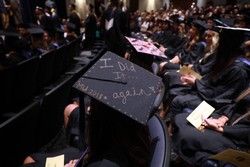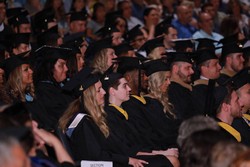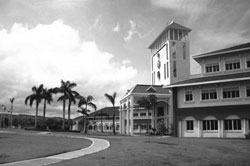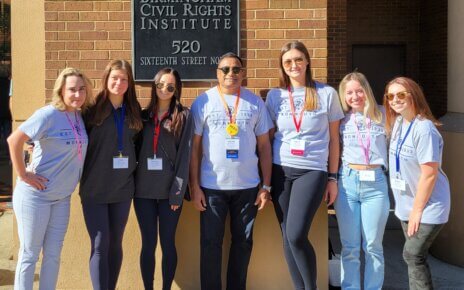Students walked in the University’s first Summer Commencement ceremony on Aug. 28 to receive their graduate and undergraduate degrees.
The ceremony itself was much smaller and more intimate than the traditional Spring Commencement held at PNC Bank Arts Center, with only 97 students being honored. At 3:00 p.m., students walked to the graduation hymn in Pollak Theater to receive their diplomas on stage, a first for the University as well. A full house welcomed the new-found graduates, including 60 faculty members and 14 members of the Board of Trustees.
“[Because] the ceremony was held in Pollak Theater, it really made it feel more personal and all eyes were strictly on you. I felt there was more of an appreciation for each individual graduate both undergrad and graduate students,” said Joseph Firetto, now an MBA student from the Leon Hess School of Business.
Firetto was one of the students who participated in the ceremony, received his B.S. in accounting. Like most of his peers, his previous plan was to walk in winter graduation before it was discontinued.
“I was originally supposed to graduate in the winter, then they got rid of winter commencement,” said Firetto. “When I enrolled in my final two undergraduate classes over the summer, I was told in mid-May that the summer commencement was happening, and I was ecstatic to find out that I will be walking and receiving my diploma months before I expected. It was a pleasant surprise.”
Summer commencement allowed Firetto to graduate a year early, and at the top of his summer accounting class.
While the ceremony itself is new, the idea has been considered for quite some time.

“This past May was the first time that we went through an academic year where we only had commencements in May,” said Mary Anne Nagy, Vice President for Student Life and Leadership Engagement. “We had the undergraduate ceremony at the PNC Center and then the next day we did a graduate ceremony on campus.”
According to Nagy, these ceremonies were for all students who completed their degrees in Summer 2017, Fall 2017, and Spring 2018.
“When we looked at the levels of participation, so how many students from each of those groups participated, what we found is virtually 95 percent of the students that finish in May participate,” Nagy explained. “The people who finished in the fall they were probably in the mid-70 range, but the people who finished in the summer were our smallest group, it was like 22 and 32 percent.”
Nagy said that the numbers were disheartening for the summer group because their hard work towards their degrees were not being recognized. She believes that these low numbers may be caused by the long grace period between the completion of their programs and the spring ceremony, creating less engagement with the University as students and alumni.
“We want students to continue their engagement with us. It’s not just you’re a student and you go away and never come back, but that you come back as an engaged alum. Maybe you take a class, come to a social event, or support the University in some fashion,” said Nagy. “If you leave with a positive experience and feeling, you’re more likely to be able to do those things.”
The Summer 2017 graduates falling through the cracks prompted the University to take action, hence the creation of the Summer Commencement.
Before going forward with implementing Summer Commencement, the Commencement Committee did a survey inquiring about student participation for students eligible for the ceremony. Results of this survey were positive, with a response rate of over 50 percent. Graduate students had a higher response rate than their undergraduate counterparts.
Like Nagy, Amy Bellina, Director of Student Activities & Student Center Operations, felt that summer graduation would help recognize the accomplishments of students that may have been left behind if they otherwise solely relied on spring graduation.
“I think students want to graduate at the original time they expected, but several factors can contribute to them going longer like changing a major, doing a double major, or graduating early,” Bellina noted. “This commencement gave them a chance to easily participate in a commencement closer to the time they complete their program.”
The benefits of the ceremony appear to showcase that summer commencement is a suitable replacement for winter commencement. Nonetheless, it does have its drawbacks.
Christine Hatchard, Ph.D., Chair of the Psychology Department and professor of psychology, weighed in on the cons.
“I found summer graduation comparable to winter graduation in terms of the ceremony, but it’s obviously a smaller event than spring commencement,” said Hatchard. “The main benefit is that students who finish their degree requirements in the summer do not have to wait until the spring to walk in graduation… students who complete their requirements in the fall have to wait until the spring.”
As an alternative, the commencement does reach out to several students. Yet, it does not replace the yearning for participating in spring graduation.
“From speaking to students, it seems their first choice would be to walk in spring commencement if they are within six credits of completing their degree requirements, as is the policy at some other institutions,” said Hatchard. “Since that’s not permitted, offering summer commencement is a good option as we owe it to our students and their families to give them a proper celebration of their accomplishments.”
Students are vocal about their own opinions regarding the differences between the various graduation ceremonies.
“I feel that while summer graduation is an option, walking isn’t the same as spring graduation,” said Justin DeMattico, a junior fine arts student. “You don’t get the whole experience of being at PNC and hundreds of names being called, the experience just doesn’t feel equal in my mind.”
Although summer commencement does not draw the same crowd as the traditional spring commencement, students can benefit from a quicker alternative ceremony that prevents them from waiting several months to hold their diplomas.
“I really hope they continue summer graduation,” stated Jackie Korzelius, a senior psychology student who spoke according to his experience as a transfer student. “I’m a transfer here at [Monmouth University] and became a semester behind. Summer graduation would really benefit me because I know that transitioning into graduate school would get in the way of me being able to walk in Spring 2020.”
By continuing summer commencement, transfer students like Korzelius will be able to have more options when it comes to participating in a graduation ceremony.
The future looks bright for a commencement ceremony in Summer 2019. The Commencement Committee will meet in a few weeks to discuss the possibility of summer commencement continuing this upcoming summer, and introducing possible improvements to the ceremony to make it more of a success.
PHOTO COURTESY of Monmouth University




